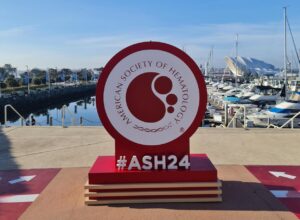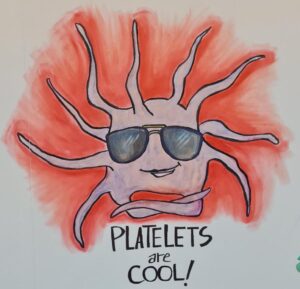
13 Dec 2024
Key highlights from ASH 2024
From December 6th to 10th, the Annual Society of Haematology (ASH) Conference gathered over 30,000 haematology experts to share groundbreaking research and insights. This event provided a platform to discuss critical advancements, innovative treatments, and the challenges in treating blood cancers, including leukaemia.
groundbreaking research and insights. This event provided a platform to discuss critical advancements, innovative treatments, and the challenges in treating blood cancers, including leukaemia.
With hundreds of talks and thousands of posters, the conference showcased a vast array of findings, many of which bring hope to those affected by leukaemia.
Here’s a roundup of some key highlights for leukaemia patients, their families, and healthcare providers.
Acute Lymphoblastic Leukaemia (ALL): Blinatumomab Breakthrough
Thousands of haematologists sat to hear the major win for patients with B-cell Acute Lymphoblastic Leukaemia (B-ALL) presented by Dr Rachel Rau. Her Phase 3 trial showed that using blinatumomab with high-dose chemotherapy improved survival rates, reduced adverse events, and decreased relapse risk. This is especially impactful for children and adults, as treatments for ALL have largely stagnated over the past 20 years. These results could pave the way for a new standard of care.
Here in the UK, access to innovative treatments like blinatumomab can often lag behind. To bring these life-changing advances to patients sooner, it’s vital to push for swift regulatory approval, inclusion in NHS treatment pathways, and funding through organisations like NICE. At Leukaemia UK, advocacy is at the heart of what we do. We work closely with policymakers, researchers, and healthcare providers to ensure the latest therapies are accessible to UK patients. By amplifying the voices of patients and families, we’re determined to bring breakthroughs like this one within reach as quickly as possible and improve outcomes for everyone affected by leukaemia.
A big discussion at this year’s ASH conference was diversity and equality in healthcare. A section of talks focused on these issues within children and young adults’ treatment when faced with ALL. The issues focused on USA studies and showed that a lot of problems were access to clinical trials and health insurance. A big difference in the UK is the ability for anyone to have healthcare treatment when faced with a devastating diagnosis such as leukaemia. Sadly, this is not the case internationally and survival rates are impacted by the ability to access medication. A report showed that in the USA even if someone is given health insurance for their first treatment they can then lose access when their condition improves or they go into remission, and upon relapse (which as we all know is common in blood cancer treatment) can no longer get treatment.
Acute Myeloid Leukaemia (AML): Targeted Approaches
While AML remains a challenging type of leukaemia, several studies at ASH offered optimism: 
Combining Venetoclax with Traditional Chemotherapy
One of the standout themes was the continued exploration of combining venetoclax, a BCL-2 inhibitor, with chemotherapy regimens like the traditional 7+3 treatment. This combination therapy, which has already shown promise with azacitidine, has the potential to improve outcomes in AML patients, particularly those with high-risk profiles.
Advances in High-Risk AML
Another major area of focus was improving treatment options for high-risk AML patients, including those whose leukaemia has evolved from myelodysplastic syndromes (MDS) or chronic myelomonocytic leukaemia (CMML). A study led by the Dana-Farber Cancer Institute found that CPX-351, a liposomal formulation of daunorubicin and cytarabine, significantly improved survival compared to the traditional 7+3 chemotherapy regimen.
Additionally, a trial evaluating a post-transplant maintenance regimen combining venetoclax with decitabine-cedazuridine showed promising results for preventing relapses.
Addressing the TP53 Mutation
While no significant breakthroughs were reported this year, the TP53 mutation continues to be a central challenge in AML research. Discussions at the conference emphasised the difficulties in treating AML patients with this mutation and highlighted the ongoing need for effective targeted therapies. TP53-mutated AML remains one of the most difficult subtypes to treat, and clinical trials are seen as essential to better understand how to manage this mutation. Researchers are hopeful that future studies will provide more insights and potentially lead to innovative therapies that target this mutation directly.
The research presented at ASH 2024 reinforced the need for personalised treatment approaches, particularly in high-risk AML patients.
Chronic Lymphocytic Leukaemia (CLL): CAR-T and Outpatient Therapies
For CLL, advancements in CAR-T cell therapy were particularly notable. Studies highlighted its effectiveness in inducing remission, even in cases resistant to traditional treatments.
Moreover, a novel outpatient treatment model was presented, allowing chemotherapy to be administered at home using infusion pumps. This approach improves quality of life by reducing hospital stays and offering more flexibility for patients.
New findings from the AMPLIFY study show promising results for treating chronic lymphocytic leukaemia (CLL) in patients who haven’t had previous treatment. Researchers tested a combination of two drugs—venetoclax and a newer BTK inhibitor—for a fixed period. This study suggests the combination therapy could be a more effective option for CLL patients in the future.
Chronic Myeloid Leukaemia (CML): Advances in TKI Therapy
Patients with CML saw hope in developments related to TKI (Tyrosine Kinase Inhibitor) therapy. Ongoing trials revealed that some patients with a deep molecular response can safely pause their medication, reducing long-term side effects. Additionally, next-generation TKIs are showing promise for patients with drug-resistant mutations, such as T315I.
Monitoring for minimal residual disease (MRD) also emerged as a vital tool in CML management, ensuring precise adjustments in treatment to maintain remission.
New Therapeutics
Several pharmaceutical companies introduced new therapeutics to target diseases including leukaemia. Although currently only licensed in the USA we hope that soon access to these new treatments will come to the EU and UK.
 The introduction of multi-cancer early detection tests by GRAIL could significantly improve early leukaemia diagnosis and many other aggressive cancers. By identifying cancers earlier, these tests allow for timely and more effective treatment.
The introduction of multi-cancer early detection tests by GRAIL could significantly improve early leukaemia diagnosis and many other aggressive cancers. By identifying cancers earlier, these tests allow for timely and more effective treatment.- Syndax Pharmaceuticals introduced a first-in line menin inhibitor, Revuforj, for AML with KMT2A rearrangements, which faces an 82% relapse rate. This innovative drug blocks the interaction between menin and KMT2A, preventing disease progression.
- A new treatment option in chronic graft versus host disease (cGVHD), Niltimvo, was presented by Incyte corporation. This is now also licensed in the USA and showed a quick improvement in patients (under 1.5 months of treatment) in 75% of patients, with initial responses seen within 7 days of starting treatment.
The 2024 ASH Conference highlighted extraordinary strides in the fight against leukaemia and other haematological diseases, showcasing innovations that bring hope to millions worldwide. From MRD monitoring to NGS-guided treatments, personalised care is becoming the foundation of leukaemia treatment, offering better outcomes by tailoring therapies to each patient’s unique genetic and molecular profile. Breakthroughs in drug approvals, improved transplant protocols, and cutting-edge genetic research are transforming care across all leukaemia subtypes. The span of work at the conference was truly inspiring from research groups focusing on only red blood cell membranes and how understanding these better can improve outcomes for patients affected with clotting diseases to sickle cell disease; to research groups looking holistically at how at home chemotherapy can improve outcomes.
For patients, families, and advocates, staying informed about these advancements is crucial. At Leukaemia UK, we remain dedicated to sharing these vital insights and working toward a future where leukaemia is no longer devastating lives.

Discover our research blogs.
Related posts
10 August 2022
Leukaemia UK unveils an exciting new brand
Leukaemia UK has today revealed a bold new look and feel that embodies the charity’s ambitious new strategy and our desire to be a greater force for change. Bringing together…
28 November 2022
Leukaemia UK John Goldman Fellow awarded Professorship
Talented blood cancer researcher, Vignir Helgason, was awarded a Leukaemia UK John Goldman Fellowship in 2015, for his research into chronic myeloid leukaemia (CML). Since then, his research career has…
21 May 2020
A new clinical trial announced
A study into the impact of severe covid-19 infection on patients who receive stem cell transplants for blood cancers and blood disorders.
19 February 2024
Leukaemia UK launches new Patient Care Pioneer Award funding initiative
Leukaemia UK is delighted to launch a brand-new funding scheme in 2024, intended specifically for innovative, patient-focussed applied research and targeting UK-based healthcare professionals. The first of its kind for…